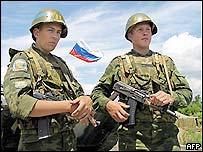
MOSCOW KILLS BODEN PAPER, THREATENS TO TERMINATE UNOMIG IN GEORGIA
Publication: Eurasia Daily Monitor Volume: 3 Issue: 26
By:

During his five-day visit to Germany, Georgian President Mikheil Saakashvili told the press that Russia’s process of self-definition includes the issue of recognizing where Russia’s borders end. In Georgia’s case, the unlawful presence of Russian troops within Georgia’s borders represents the only real source of threat to the country’s security and territorial integrity, he noted (Sueddeutsche Zeitung, February 3).
The conflict in Abkhazia (like that in South Ossetia) has clearly turned from an “ethnic conflict” over collective minority rights into an inter-state conflict in which Russia is moving the border and de facto annexing this part of Georgia by force. Western governments (not to mention the United Nations and OSCE) have long tried to ignore this process. They will find it more difficult to sustain such insouciance after Russia’s official rejection of the Boden Paper — the only existing basis for internationally assisted negotiations on Abkhazia’s political status within Georgia.
In the UN Security Council’s January 26 meeting, devoted to the conflict in Abkhazia, the Russian side withheld its support from the basic principle of the conflict resolution process — defining Abkhazia’s status within the state of Georgia. By the same token, the Russian side ruled out the usual (if largely theoretical) reference to the Boden Paper in the Security Council’s resolution. Furthermore, it declared that this document can no longer be considered as a possible basis for negotiations on Abkhazia’s status.
Senior German diplomat Dieter Boden authored that document, “Basic Principles on the Distribution of Competencies between Tbilisi and Sukhumi,” in 2001 while serving as Special Representative of the UN Secretary-General for Georgia. It is a highly flexible proposal, allowing for negotiations on the broadest possible competencies for the Abkhaz within the state of Georgia and the return of Georgian refugees to their homes. However, the Abkhaz side has refused all along to take official delivery of the Boden Paper during negotiations. Moscow encouraged the Abkhaz rejection, but did not itself veto references to it during the negotiating process. Now, however, Moscow no longer finds it necessary to hide behind the Abkhaz in rejecting the document. Thus, no document exists any longer as a basis for negotiations on Abkhazia’s status within Georgia. In practice, this means that Russia is set on cementing an ethnically cleansed Abkhazia’s secession from Georgia.
Moscow’s step is almost certainly intended in part as an affront to the European Union. Boden is reported to be the front-runner candidate to become the EU’s Special Representative for the South Caucasus, replacing a fatigued incumbent. Selection of a figure of Boden’s caliber for this post suggests that the EU is becoming serious about its engagement in the region. Thus, Russia’s move at the UN looks like a shot across the EU’s as yet unsteady bow in the South Caucasus
The UN Security Council meets twice a year to renew the mandate of the United Nations Observer Mission in Georgia (UNOMIG), which has been stationed in Abkhazia since 1994 alongside Russia’s “peacekeeping” troops. The Security Council’s January 26 meeting was supposed to grant another six-month routine extension. However, veto-wielding Russia only consented to a technical rollover of the mission’s mandate for two months.
Although UNOMIG is a passive, largely irrelevant factor that never dented Russia’s “peacekeeping” monopoly — indeed it depends entirely on the Russian troops for its own security and minimal activities — UNOMIG’s mere presence is important as a potential witness to possible moves against Georgia by the Russian military. Without that presence, Georgia would be left face-to-face with Russia in Abkhazia. This is why Moscow has a number of times threatened to veto the UN Security Council’s six-month extensions of UNOMIG’s mandate, if Georgia would demand the withdrawal of Russia’s “peacekeeping” force or its internationalization. The consensus-bound United Nations traditionally went along with this form of Russian blackmail on Georgia. Moreover, the Security Council bowed to Moscow every six months by inserting a laudatory reference to Russia’s “CIS peacekeeping” operation in the relevant resolution.
Russia now faces a July 2006 deadline, set by Georgia’s parliament in October 2005, for an assessment of the real purposes and performance of the “peacekeeping” operation in Abkhazia. In view of its record, it seems likely that Georgia would in July call for this operation’s termination in its present form, by a specific date. Such termination could take the form of withdrawal of the Russian troops and introduction of an international contingent that would operate in accordance with the UN’s standards for peacekeeping operations. Moscow’s implied threat to terminate UNOMIG in two months is a response to Georgia’s decision to reexamine and possibly demand the eviction of Russia’s “peacekeepers.”
Taking the floor in the Security Council debate, Georgia’s permanent representative to the UN, Revaz Adamia, and presidential representative for Abkhazia issues Irakli Alasania, reaffirmed Tbilisi’s willingness to negotiate with the Abkhaz on broad competencies within the Georgian state. At the same time they noted that Moscow’s conduct had disqualified it from the official role of “facilitator” in the Tbilisi-Sukhumi negotiations, and that Russian troops had become an instrument of Russia’s de facto incorporation of Abkhazia.
Meanwhile, Russia’s “peacekeeping” troops in South Ossetia face a Georgian assessment deadline this month. Moscow itself, through its conduct, seems to be setting the stage for Georgia to call for the withdrawal of Russian troops from these occupied territories.
(Documents of the UN Security Council session, January 26, 27; Interfax, October 3, 2005)




